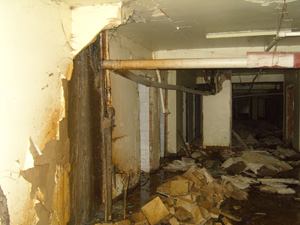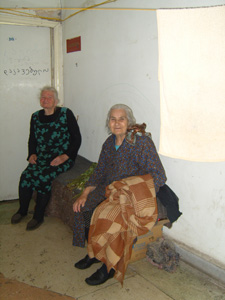Shorena Latatia
 Initially, 1 500 IDPs were sheltered in the building of the former Russian military hospital in Isani district in Tbilisi. Nowadays, about 600 IDPs live there. 390 of them are so-called new IDPs (displaced as a result of the war in August of 2008) and 210 so-called old IDPs (displaced during the armed conflicts in 1990s). Although more than one and half year has passed since the August war, the IDPs living in this building have not received an IDP status and single money allowance yet.
Initially, 1 500 IDPs were sheltered in the building of the former Russian military hospital in Isani district in Tbilisi. Nowadays, about 600 IDPs live there. 390 of them are so-called new IDPs (displaced as a result of the war in August of 2008) and 210 so-called old IDPs (displaced during the armed conflicts in 1990s). Although more than one and half year has passed since the August war, the IDPs living in this building have not received an IDP status and single money allowance yet.
Foreman of the settlement Dato Turashvili said in his interview with the Human Rights Center that several old IDPs, who were over 80, died in the shelter without getting allowance. Currently, 5 old IDPs from South Ossetia live in the shelter and they still hope to get compensations.
Nevertheless, the problem of compensation and status is nothing in comparison with the problems related with the building of the former hospital. The internally
 displaced people were sheltered in the building were laboratories were working in the past and only specialists could enter there. The IDPs had to clean the rooms and repair the damaged sewerage system themselves. As it was expected, the IDPs could not repair the system completely with the small money they collected and the toilet has not been working properly more than one year. The sanitary sewage is flowing to the basement of the building and it creates serious danger for the IDPs not to speak about the terrible smell in the building. The anti-sanitary in the territory of the former hospital in summer increases the risk of infection among IDPs.
displaced people were sheltered in the building were laboratories were working in the past and only specialists could enter there. The IDPs had to clean the rooms and repair the damaged sewerage system themselves. As it was expected, the IDPs could not repair the system completely with the small money they collected and the toilet has not been working properly more than one year. The sanitary sewage is flowing to the basement of the building and it creates serious danger for the IDPs not to speak about the terrible smell in the building. The anti-sanitary in the territory of the former hospital in summer increases the risk of infection among IDPs.
The lawyer of the Human Rights Center Nikoloz Legashvili applied to the Isani-Samgori district administration regarding the problem, but the district officials replied the Ministry of Refugees and Accommodation was in charge of the problem. The head of the department at the ministry Koba Gorgodze clarified in his interview with Legashvili that the ministry already has information about the problem and will resolve it without coordination of the Human Rights Center.
Unfortunately, the problem resolved by the coordination of the ministry still remains unresolved. Koba Gorgodze does not want to answer the phone call after he hung up the receiver.
News
December 13, 2023
Ethnic minorities outside the peace dialogue
November 6, 2023
‘Peace’ agenda of political parties
Popular
Articles
February 13, 2024



